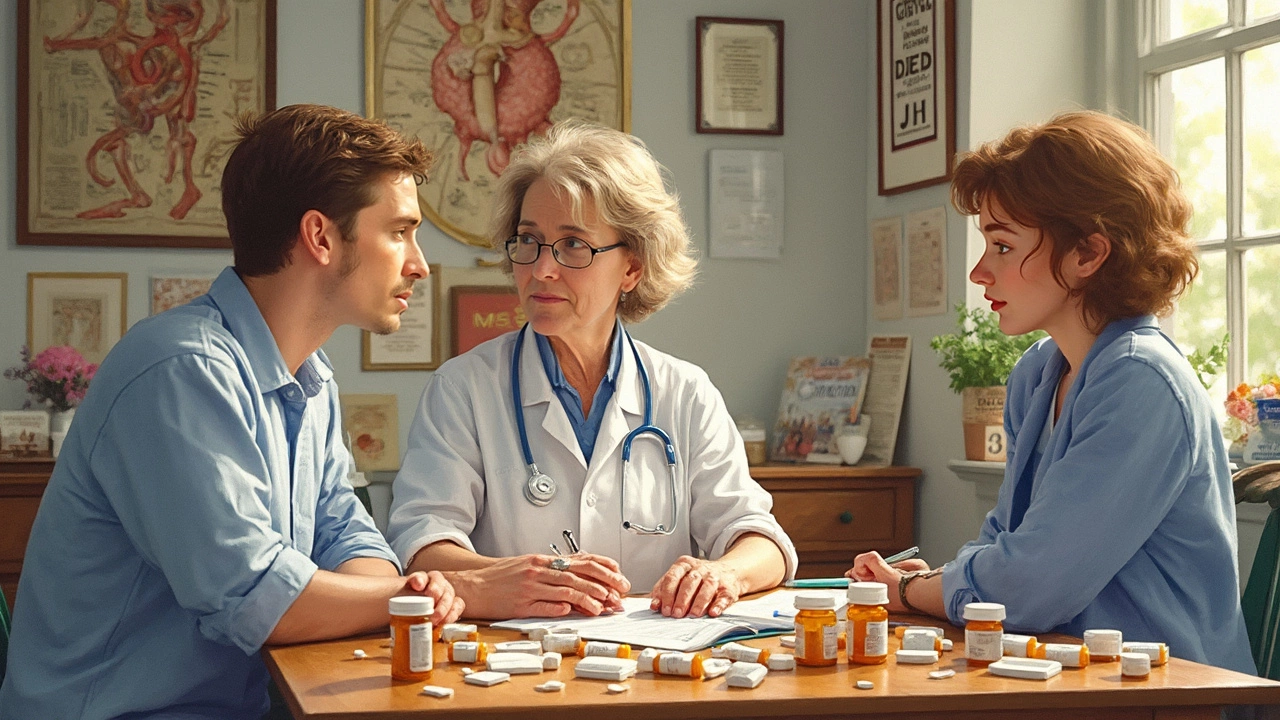 Mar, 19 2025
Mar, 19 2025
When you're feeling under the weather or dealing with a nagging health issue, the first port of call for most of us is our local GP. But have you ever wondered exactly what kinds of prescriptions they can provide? Honestly, it's more extensive than you might think!
Your GP, or general practitioner, can offer prescriptions for a wide range of medications. This can include treatments for common ailments like infections, allergies, or headaches. However, their ability doesn't stop there—GPs play a significant role in managing chronic conditions like diabetes, asthma, and high blood pressure too.
Preventative care is another crucial area where GPs step in. They're your go-to for vaccines and health advice to keep ailments at bay in the first place. Still, it’s good to remember that there are some limits to what they can prescribe, usually if a condition requires specialist care.
- Role of the GP
- Common Prescriptions
- Chronic Conditions Management
- Preventive Care
- Limits of GP Prescriptions
- Tips for Effective GP Visits
Role of the GP
The role of a general practitioner (GP) is diverse and crucial. Think of them as the quarterback of your healthcare team, directing you where you need to go. They’re the frontline defense when it comes to both acute illnesses and managing long-term health issues.
GPs are trained to diagnose a wide range of conditions and are the first point of contact for many patients. Whether it’s a routine check-up, a vaccination, or an unexpected illness, your GP is there to help. They're equipped to prescribe medications for common ailments like cold or flu, and also manage more serious conditions like asthma, diabetes, or even depression.
Comprehensive Health Management
A huge part of a GP’s role is managing chronic conditions. So, if you or a family member have been diagnosed with something that requires consistent attention, like high blood pressure or diabetes, your GP is likely overseeing the management of that condition. They ensure that you're on the right medication and receiving the necessary lifestyle advice.
Preventive Care and Screenings
Your GP is also your partner in preventive care. This means they’re keeping an eye out for any signs of potential health problems and advising on ways to keep them at bay. They might suggest lifestyle changes, regular screenings, or even offer vaccinations to prevent future illnesses.
Trust is key in the GP-patient relationship. They provide a safe space where you can discuss any health concerns, big or small. But remember, there are certain limits to what a GP can handle. For highly specialized conditions or surgeries, they are likely to refer you to a specialist. However, they'll remain in the loop to help coordinate your overall care, which is pretty comforting if you ask me!
Common Prescriptions
When we talk about what a GP can prescribe, we're diving into a pretty broad area. Most folks think it's just about antibiotics and painkillers, but there's much more to it.
Antibiotics
These are probably the most well-known meds GPs hand out. For bacterial infections like ear infections or strep throat, antibiotics are the go-to. However, it's crucial to note that these aren't for viral infections like the common cold.
Pain Relief
Got a headache or some pesky arthritis pain? Your GP can prescribe a range of pain relief options from ibuprofen to more potent medications if needed. It’s about finding the balance between effectiveness and safety.
Allergy Medications
Dealing with seasonal allergies can be a real pain. GPs often prescribe antihistamines or nasal sprays to keep the sneezing and itching at bay.
Asthma and Respiratory Aids
Inhalers and other medications to help open up the airways are frequently prescribed for asthma and other respiratory conditions.
Mental Health Medications
This area has expanded significantly. GPs can prescribe antidepressants or anxiety medications, often in conjunction with therapy referrals to help manage mental health.
Hormonal Treatments
From birth control to hormone replacement therapy, your GP can guide you through the options and help find what suits best.
Table of Commonly Prescribed Medications
| Medication Type | Common Uses |
|---|---|
| Antibiotics | Bacterial Infections |
| Ibuprofen | Pain, Inflammation |
| Antihistamines | Allergies |
| Inhalers | Asthma |
Ultimately, while GP prescriptions cover a lot of basics, understanding what they can and can't provide helps set expectations straight. It's always best to talk openly with your GP about any concerns or questions to get the right meds for you.
Chronic Conditions Management
Living with a chronic condition isn't easy, but your local GP is a key player in helping you manage it day-to-day. These are the folks who help with the big stuff—like coordinating your care, ensuring you're on the right meds, and making lifestyle recommendations that can make a big difference.
Medication and Monitoring
First off, your GP can prescribe the necessary medications to help manage conditions like diabetes, asthma, or hypertension. Whether it's insulin, inhalers, or blood pressure pills, they ensure your treatment is tailored to your needs.
A part of good chronic care is regular monitoring. GPs often arrange blood tests, monitor blood pressure, and keep track of other vital stats to see how well the treatment is working. They act as the first line of defense, spotting any changes before they escalate.
Coordinating with Specialists
Your GP isn't working alone. They're like the hub of a wheel, coordinating with specialists when your condition requires more focused attention. Say you're dealing with a particularly stubborn case of arthritis; your GP might refer you to a rheumatologist but will remain updated on your overall treatment plan.
Lifestyle Advice
Don't underestimate the power of lifestyle advice from your GP. They provide guidance on diet, exercise, and mental health that can be game-changing. And let's be real—having someone in your corner, reminding you to stay active or try a new diet, can be just the push you need to make those healthy changes.
For those who love some numbers, consider this: according to recent stats, around 60% of adults in the US have at least one chronic condition. Check-ups and proactive management by your GP can lead to better outcomes for these individuals.
Chronic conditions can be a beast, but with the right support from your GP, it becomes a lot more manageable.

Preventive Care
Preventive care is one of those things that often gets overlooked until it’s too late, but your GP is actually a fantastic ally in keeping you healthy before problems start. Basically, it's all about catching issues early or stopping them from ever happening.
Vaccinations
Feeling stuffy and achy is no fun, especially when it can be prevented. That's why GPs offer vaccinations for everything from the flu to shingles. Vaccinations are a key part of stopping preventable diseases in their tracks, and your local general practitioner knows exactly what's recommended for your age and health condition.
Health Screenings
Screenings are like the detective work of the health world. Your GP can arrange tests to catch conditions like diabetes, high blood pressure, and cholesterol before they cause serious issues. It's kind of like checking the engine before a road trip – better to know all’s running smoothly.
Healthy Lifestyle Coaching
Your GP is like that friendly coach who wants you to succeed. They're on hand to offer advice on quitting smoking, eating healthy, or getting more exercise. Imagine a personal coach, but in a white coat! They might not run the marathon with you, but they’ll help get you to the starting line.
Regular Check-Ups
Annual check-ups are like a report card for your health. During these visits, your GP can give you the lowdown on what’s working or what might need a little tweak. It’s a great way to stay on top of things and keep bigger issues at bay.
So next time you're thinking about preventive care, remember it’s not just about what your GP can prescribe today but also about setting you up for a healthier tomorrow. Little steps can lead to big changes – and a much happier visit to your GP.
Limits of GP Prescriptions
So, what can't a GP prescribe? There are certain limits to what your GP can help with, and it’s actually pretty common for folks to run into these limits during treatment. Let's break it down.
Specialist-Only Medications
Some medications require a specialist's oversight, like those for more complex conditions such as certain types of cancer or severe mental health disorders. These specialist-only medications need an expert to monitor if they're working and to manage any side effects. So, your GP might refer you to a specialist if they think your treatment requires more advanced knowledge.
Controlled Substances
Your general practitioner is limited when it comes to prescribing controlled substances. Think along the lines of opioids or certain ADHD medications. These medicines are tightly regulated due to their potential for abuse and dependency. If such a prescription is necessary, your GP may work with a specialist or refer you to pain management clinics.
Off-Label Uses
Off-label prescriptions—using a medicine for an unapproved age, condition, or dosage—are another area where GPs tend to steer clear. While it's not illegal, it's up to the discretion of the doctor. Often, off-label uses are more common in specialist care, where doctors have more in-depth knowledge.
Even within these limitations, your GP is a vital resource in your health journey. They often serve as the gatekeeper to specialized treatments, ensuring you get the right care when things are beyond their scope. So, next time you’re at the doctor’s, knowing what they can and can’t prescribe can help streamline your appointment.
Tips for Effective GP Visits
Going to see your GP isn't always fun, but there are ways to make it worthwhile. With a few pointers, you can turn a rushed consultation into a productive appointment. First off, being prepared is key.
Be Prepared
Before your appointment, jot down your symptoms, concerns, and any questions you might have. This helps ensure you cover everything during the visit. Bringing a list of medications you're currently taking will help too. According to a study published in the Journal of General Internal Medicine, patients who prepared notes prior to their consultations had more efficient visits.
"Patients who actively engage in their health care by coming prepared to consultations often report better satisfaction and outcomes," says Dr. Stephanie Smith from the Health Institute.
Communicate Clearly
Being straightforward with your GP is important. Use simple language to describe your symptoms and don't hold back details—no matter how small. Remember, they're there to help, not judge.
Ask Questions
Sometimes we forget that it's okay to ask questions. If something the doctor says isn't clear or you need more details about a prescription, just ask. Getting a quote or explanation is your right.
Follow Up
After the visit, if you're still unsure or if symptoms persist, a follow-up is a good idea. Most GPs are happy to help clarify or adjust medication if needed.
Make the most of that GP visit by taking these steps seriously. That way, you can get those health issues sorted faster and get back to feeling like yourself sooner rather than later!
